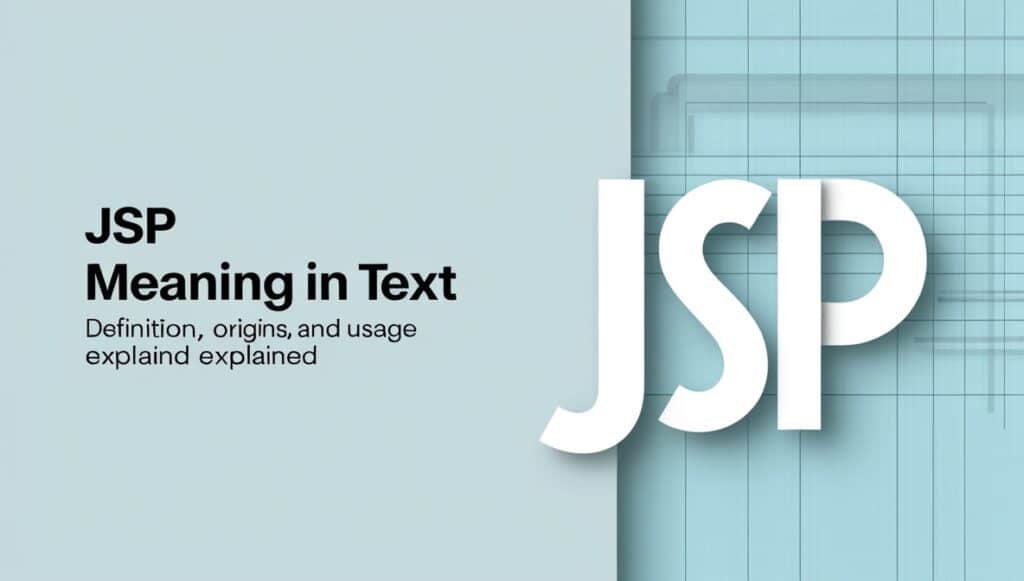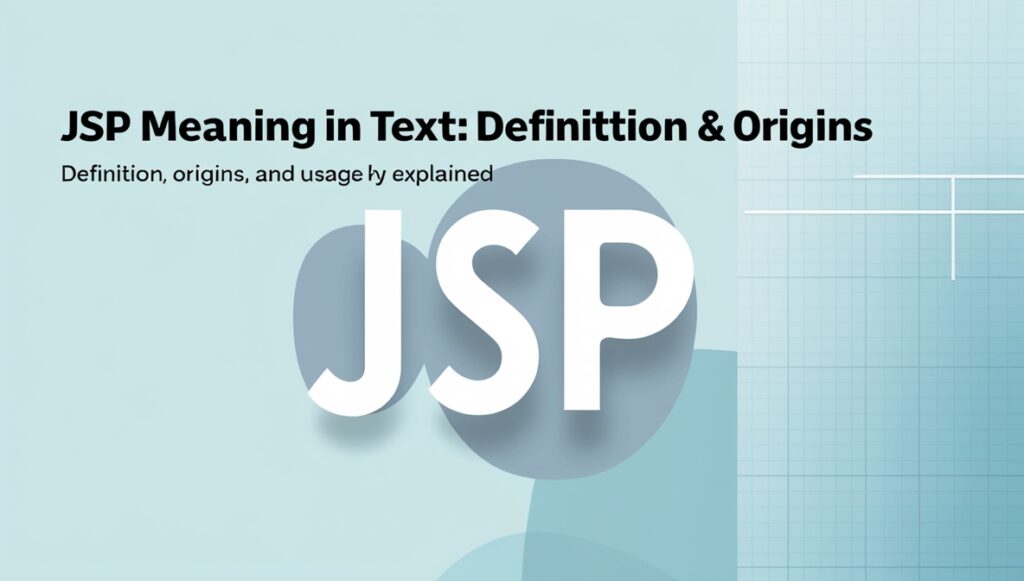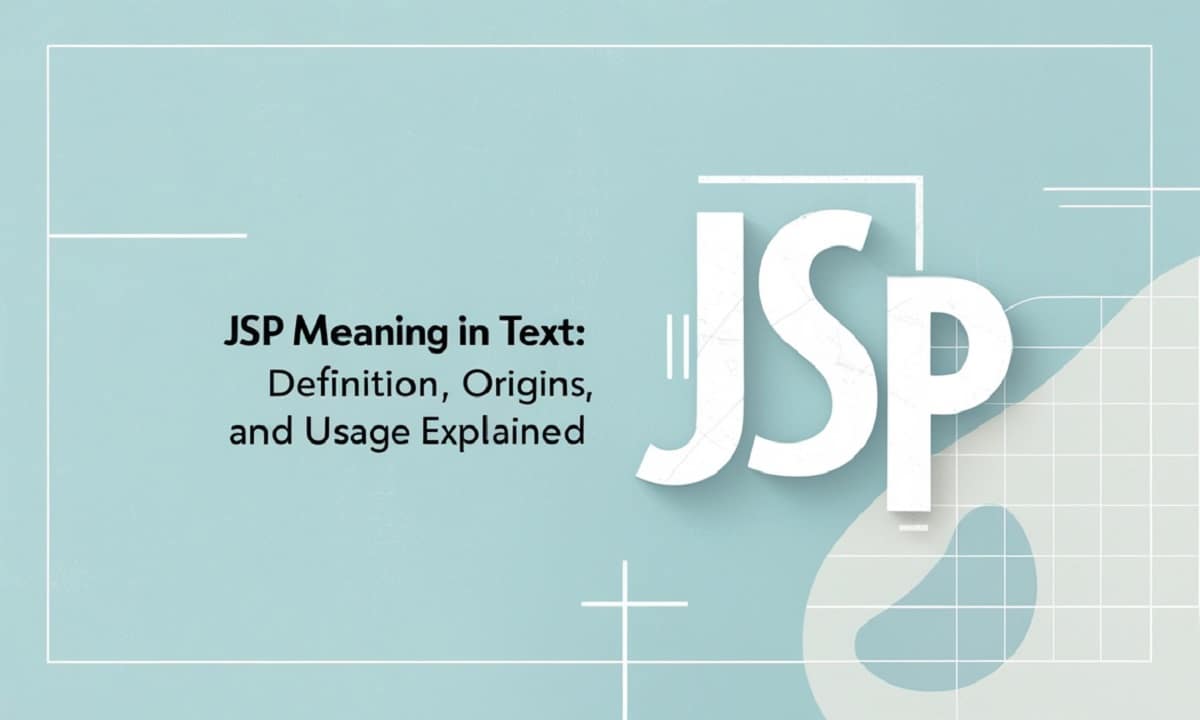Understanding JSP meaning in text can feel confusing at first glance. If you’ve ever seen “JSP” in a message and wondered what it stands for, you’re not alone. With so many texting abbreviations, it’s easy to get lost in the sea of slang terms.
This guide breaks down the JSP acronym, explains its usage in digital communication, and clears up common misconceptions. You’ll also learn when it’s appropriate to use and how to respond naturally in different contexts.
Definition & Meaning of JSP
The JSP abbreviation most commonly means “Just Saying, Period.” It’s a way to end a statement with finality, showing you don’t want further debate. Think of it as the cousin of JS (Just Saying) but with a stronger, more definitive tone.

For example:
“I told you pizza is better than burgers, JSP.”
Here, JSP shows confidence in the opinion. It emphasizes the statement, almost like dropping a mic.
Other Meanings of JSP
While “Just Saying, Period” is the most popular slang meaning, JSP can stand for different things:
- JavaServer Pages – A programming term used in web development.
- Jump Street Productions – A lesser-known reference in gaming chats and niche online forums.
Why Context Matters
Without context, slang can confuse readers. A developer might see JSP and think about JavaServer Pages, while a teenager on TikTok sees it as a casual texting short form.
Examples in Conversations
To understand JSP usage, let’s see how it works in real digital communication.
Casual texting example:
- A: “You always leave the group chat on read.”
- B: “Not true, I reply when needed, JSP.”
Social media comment:
- “That movie was overrated, JSP.”
Gaming chat:
- “I carried the team this round, JSP.”
Each example shows a slightly different tone but the same informal communication style.
Background & History of JSP
The roots of JSP slang trace back to early 2000s internet culture. Abbreviations like TBH (To Be Honest) and IDT (I Don’t Think) grew popular when SMS messages had strict character limits.
By the 2010s-present texting culture, JSP evolved as a way to emphasize opinions online. The addition of “Period” reflects internet trends where people use the word “period” in speech to underline conviction.
Meanwhile, JavaServer Pages dates back to 1999, becoming a core part of enterprise web development terminology. This overlap created one of the biggest misconceptions around JSP meaning.
Usage in Various Contexts
Texting & Social Media
In text messaging, people use JSP to add finality to a statement. On social media platforms like TikTok, Instagram, and Twitter/X, you’ll often see it in captions or comments.
Example:
- “That’s the best show on Netflix, JSP.”
It works as a subtle way of saying, “No arguments.”
Gaming Chats
In gaming terminology, quick communication is essential. Players shorten phrases to keep up with fast action.
Example:
- “We had that win secured, JSP.”
Here, JSP usage adds confidence to a claim, common in competitive banter.
Professional Settings
Can you use JSP in professional settings? Generally, no. Workplace communication values clarity over internet slang. However, in informal Slack channels or startup cultures, you may encounter it.
Tip: Stick to clear texting terms like FYI or TBH in professional communication.
Common Misconceptions About JSP
Many people confuse JSP definition with other meanings. Let’s clear them up.
- Misconception 1: It’s always technical.
- Truth: In casual chats, JSP is mostly slang, not programming terminology.
- Misconception 2: It’s offensive.
- Truth: JSP chat meaning is rarely offensive. It’s usually harmless emphasis.
- Misconception 3: It has only one meaning.
- Truth: It can mean JavaServer Pages, Jump Street Productions, or Just Saying, Period, depending on context.
Similar Terms & Alternatives
Here are some texting short forms similar to JSP:
| Term | Full Form | Tone/Usage |
|---|---|---|
| JS | Just Saying | Softer, less final |
| TBH | To Be Honest | Honest opinion |
| IDT | I Don’t Think | Disagreement |
| IMO | In My Opinion | Opinion-sharing |
These acronyms share the same casual and informal communication style.
How to Respond to JSP
Not sure how to reply when someone uses JSP? Consider these options.
- Agreeing: “True, can’t argue with that.”
- Disagreeing lightly: “Fair point, but I see it differently.”
- Neutral: “Got it, thanks for clarifying.”
When in doubt, don’t hesitate to ask for clarification. Remember, texting language changes fast, and new slang expressions appear often.
Regional or Cultural Differences
Regional differences affect how people interpret JSP in text.

- US: More common among younger users in social media slang.
- UK: Less frequent, though seen in online forums.
- Asia: Rare in texting, but JavaServer Pages remains popular in programming terminology.
Internet context determines interpretation more than geography.
Is JSP Offensive?
The short answer: No.
JSP slang meaning is assertive but not offensive. It’s closer to saying, “That’s my final word.” Still, in sensitive professional settings, avoid it to prevent misunderstandings.
“Slang gains or loses power depending on tone and context, not just words.”
FAQs JSP meaning in text
What does JSP mean in text?
It means “Just Saying, Period.”
Is JSP the same as JavaServer Pages?
Not in texting. In programming, yes.
Do teens and adults use JSP differently?
Teens use it more in casual chats. Adults encounter it mostly in social media slang.
Is JSP the same as JS?
JS means “Just Saying,” while JSP is stronger: “Just Saying, Period.”
What should I do if I don’t understand slang?
Ask for clarification or search online guides to texting abbreviations.
Conclusion
The JSP meaning in text is clear once you understand its usage and context. While it most often stands for “Just Saying, Period,” it also has technical meanings in web development and niche uses in gaming chats. Knowing the JSP abbreviation helps you navigate digital communication more confidently.
Use it casually with friends or on social media, but avoid it in formal or professional settings. Language keeps evolving. Today’s slang expressions might be tomorrow’s mainstream vocabulary. Understanding these shifts keeps you fluent in the fast-changing world of internet slang.

